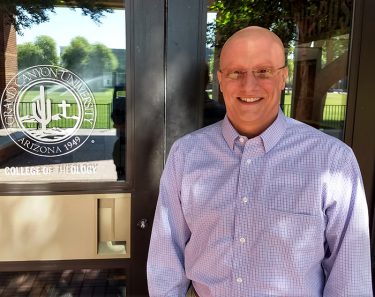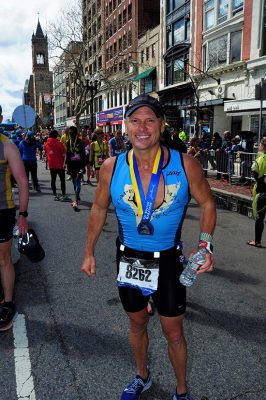
By Rick Vacek
GCU News Bureau
It is not unusual to find Grand Canyon University faculty members who bring to the classroom real-world lessons they’ve learned themselves. But Dr. Gary Osmundsen goes the extra 26.2 miles, and Dr. Rich Holland goes the distance in another way.

The next-door neighbors in the College of Theology Building both made recent news for their exploits beyond teaching philosophy.
Osmundsen ran the Boston Marathon for the second time, while Holland was interviewed on a national podcast regarding “Good Arguments: Making Your Case in Writing and Public Speaking,” the 2017 book he co-authored with Dr. Benjamin Forrest.
It was the fourth marathon overall for Osmundsen, who has become an accomplished distance runner in the six years he has been pounding the pavement. In February, he finished the Mesa-PHX Marathon in 2 hours, 55 minutes – achieving his goal of cracking the 3-hour barrier.
His time in Boston was 3:09, a minute off his mark in brutal weather the year before, but he had to fight through spasms and the remnants of cold/flu symptoms just to finish. “Marathons are fickle,” he said, quoting his friend Harry Back. “You never know what the day is going to give.”
Holland’s appearance on The Christian Humanist podcast, during which he discussed his book as well as broader areas of philosophy, illustrated the importance of knowing how to present a good argument.
The book, he said, “is intended to be an introduction to how to make the case for something. It defines what arguments are. For a lot of people, the word ‘argument’ is a negative connotation. But it’s about logic and reasoning.
“Philosophy, in my view, is the Christian’s best friend. Philosophy, in the most generic sense, is the search for truth. It is examining life’s big questions to find out what’s true and what’s not. It’s about making sense of the world. Philosophy is more like a mindset with a set of tools in a toolbox. I think philosophy leads to Christianity, but obviously there are atheists who disagree with that.”

The Pittsburgh native planned to be a career Army officer but felt a tug from God in the direction of theology. He took leave for eight straight Mondays to attend seminary classes, and the fire was lit.
These days, he loves to break down the nuances of philosophy for students, to the point where he has thought about writing a book he would title “The Meaning of Life: It’s Really Not That Complicated.” It goes hand in hand with his view of philosophy overall.
“The great thing about a philosophy course, especially on the introductory level, is that it applies to absolutely everybody because it applies to everybody who’s a human person,” he said. “All of the questions that a philosophy course answers are questions that people have anyway.
“How can I say that I know something? Philosophy answers that question. Is there such a thing as right and wrong and how do I go about determining right and wrong? Philosophy answers that question. Is there meaning to life? Philosophy answers that question. It’s a set of the most important questions people ask.”
Osmundsen, likewise, brings his experiences to the classroom. His athletic exploits have been inspirational to students and other faculty members, but they’re also educational.

“I try to parlay some of these races into my lectures and into some of the topics when they’re useful for analogies and in trying to understand some of these concepts,” he said. “Philosophy is really practical. Good critical thinking generalizes in all domains, not just sports.
“When you recognize some of the cognitive distortions that we’re prone to engage in, like catastrophizing, discounting positives or all-or-nothing thinking, you can see how that would affect an athlete’s performance. My question always is, ‘What’s your evidence for that?’ If you’re worried that something bad is going to happen, what’s your evidence?”
He makes good things happen by arising between 4 and 4:30 a.m. every day to do his training. “I have an alarm clock and his name’s James,” he said, referring to his 1½-year-old son, the youngest of his four children.
But Osmundsen, who grew up in southern New Jersey, near Philadelphia, and has sports jerseys all over the walls of his office, wants to make it clear that none of his running accomplishments would happen without the assistance of his wife, Julie, and everyone around him. He is grateful and says the experience has both humbled and stretched him.
“She’s just a great support, and I need that,” he said. “I need my colleagues’ support. I need my family’s support. My mom and dad, the cool thing is they always supported me – tee ball, pee wee wrestling, all the way up to now, and they still go to nearly every one of my events.”
The family has rented a cabin for July in Lake Placid, N.Y., where Osmundsen is scheduled to compete in the 140.6-mile Ironman Triathlon. The former weightlifter has become fascinated by the marathon lifestyle and believes that pushing yourself when no one is watching is illustrative of life in general.
“The more we learn how to do the right thing because it’s the right thing to do, period, the more successful we’re going to be at living life well and skillfully,” he said.
He might even follow in Holland’s footsteps and write about his running experiences. He knows that family, friends and co-workers are tracking his progress online when he runs a big race, such as Boston, and he truly wants to inspire more people to take better care of their bodies:
“People consult me for advice and recommendations. When they say, ‘My lifestyle is too busy. I can’t fit it in.’ My response is, ‘Your life’s too important not to fit it in.’ Your performance is too dependent on you getting that workout in because when we forgo it, I don’t think we are as productive, we aren’t as sharp.”
“And it’s meditative. During maintenance runs, I’m listening to an audio book or I’m having conversation with God and praying while I’m running. I think about things I wouldn’t normally think of during the day.”
Then he goes into the classroom and gives students things they might not normally think of, either. That’s how Osmundsen and Holland disseminate knowledge – one step, one chapter, one real-world experience at a time.
Contact Rick Vacek at (602) 639-8203 or [email protected].
****
Related content:
GCU Today: Theology instructor finds peace in the long run
GCU Today: Grand Canyon Seminary receives full accreditation



































































